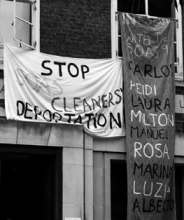Will the CWU deliver?
In spite of the withdrawal of the Labour government’s plans to privatise the Royal Mail, postal workers’ campaign of strike action continues. In truth, postal workers consider privatisation has already happened, when the profitable parts of the business were hived off in the 2006 “liberalisation” exacerbating the problems the Royal Mail faces. The dispute is about “modernisation” – job cuts, attacks on pay, conditions and pensions – and the bullying which has passed for management in the Post for many years. CWU members believe that management are seeking to break the union.
Workers in London and Edinburgh struck on Friday 19th June, and elsewhere in Scotland on Saturday 20th. Management are not honouring the 2007 agreement on modernisation, in spite of record profits delivered by postal workers. Another rolling programme of strikes hit London on 8th-10th July, with delivery offices, distribution and logistics workers, and mail centres striking on consecutive days, as part of a longer programme. A national day of action was planned for Friday 17th July and other areas of Britain were seeking ballots on industrial action.
It is likely that the dispute will become national, with a real possibility that if the union leadership continue to avoid a confrontation with the government that unofficial national strike action will break out. There is also a feeling among the union’s members that its leadership has kept silent on MPs’ expenses and failed to support its members against the Labour government. However, the rank and file of the CWU has been far more militant than its leadership for decades now – Alan Johnson is a former General Secretary of the union – so we will watch developments with interest rather than expectation.
Sweep ISS out of SOAS
On June 12th, cleaners working for ISS at the School of Oriental & African Studies (SOAS) in London were called to a meeting by management. The cleaners were “processed” by immigration officials who detained nine of them as “illegal immigrants”. It was perhaps no coincidence that a picket of SOAS’ governing body demanding the reinstatement of victimised SOAS UNISON Branch Chair José Stalin Bermudez, who had been prominent in organising cleaners, had been called for that morning.
Those detained were denied union representation, but a campaign was quickly organised by SOAS campus unions and students, migrant worker activists and anti-deportation campaigners. SOAS management was held responsible for ISS “ambushing” their cleaners as punishment for winning union recognition and the London Living Wage.
Academy schools programme expanded
A new Education Bill is set to massively extend Labour’s controversial Academies programme.
The Education Secretary Michael Gove has now added Ofsted-graded “outstanding” schools to the hit-list. His plans promise even more Academies; over 150 schools have already applied for Academy status, with hundreds more enquiring for further information or registering an interest. The Academies scheme allows non-state bodies, including religious groups, businesses and voluntary groups to take control of schools in exchange for a nominal amount of funding for new facilities.
Mail strike's roots in unfinished business
Workers at Royal Mail have voted overwhelmingly in favour of strike action over management plans for job cuts. 76% of workers who responded to the ballot voted in favour of industrial action. The roots of the dispute go back to the settlement that ended the 2007 national postal strike.
At the time it was announced as a victory, but in fact the CWU union agreed to management plans to cut jobs. The ‘victory’ was that the CWU and Royal Mail management would negotiate the details of the cuts at a local level. Now postal workers are unhappy with the results of those negotiations. One trigger is the Royal Mail’s refusal to “Pay for Change.” In unilaterally imposing such changes by so-called ‘executive action’, Royal Mail have reopened the dispute.

